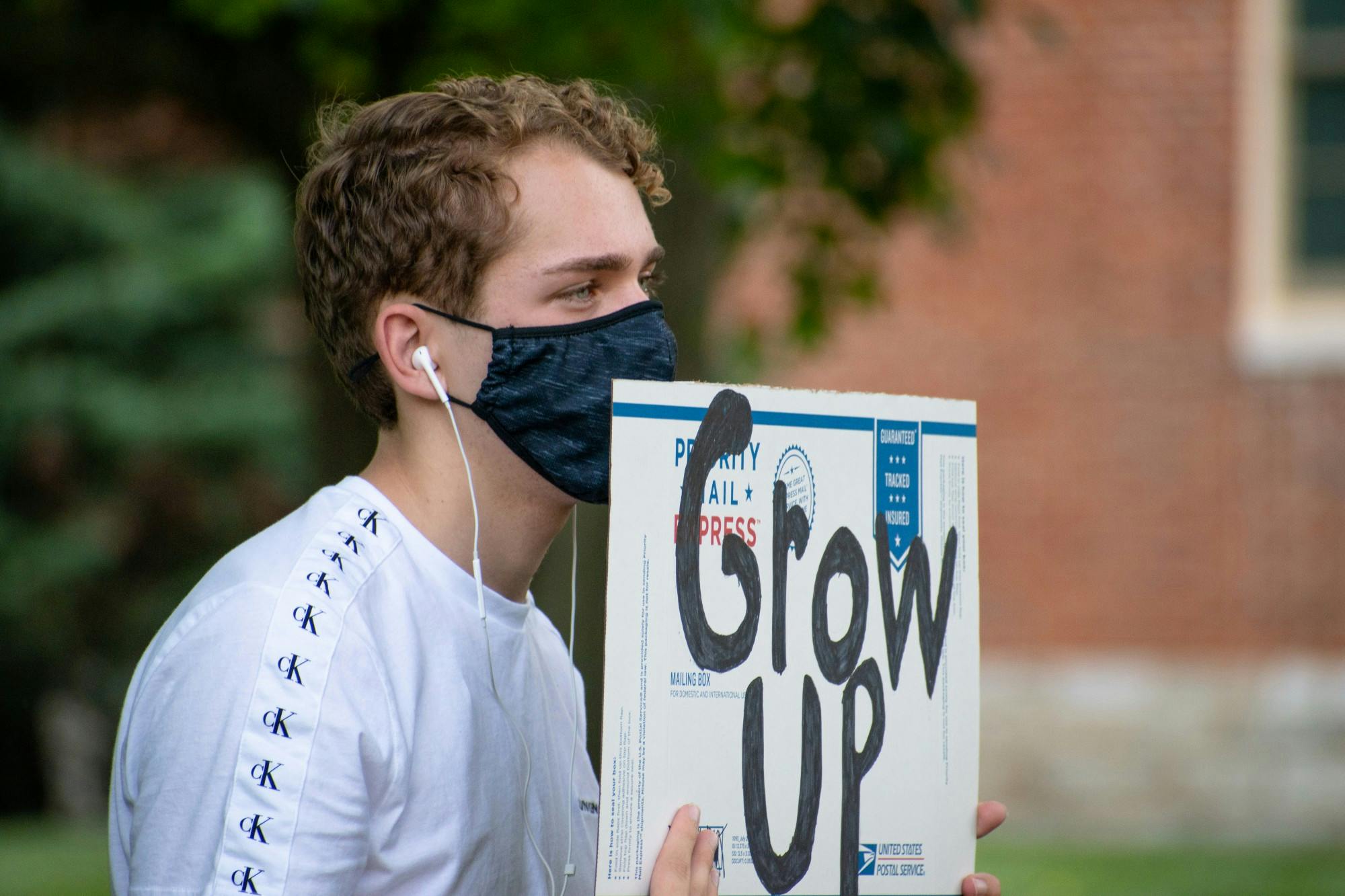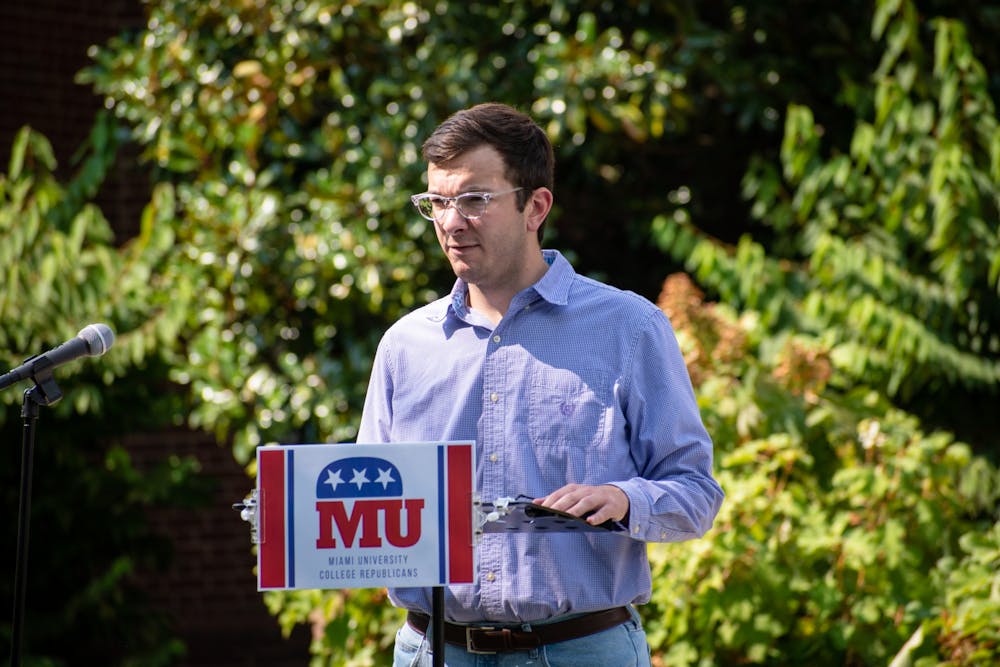Miami University’s College Republicans (CRs) hosted a press conference in opposition of Miami’s new mask policy, which requires masks to be worn indoors on campus regardless of vaccination status.
The conference, which took place Aug. 11 at 4 p.m. in front of Roudebush Hall, included speeches from Ohio State Senator George Lang, Ohio Representative Thomas Hall, political candidates and CR representatives.
The audience was small, only a handful of people in addition to the speakers that were featured in the event.
Senior political science major Collin Finn, CR Chairman, helped organize the event after he and other CRs voiced their opposition to the mandate on social media. He said CRs reached out to politicians in hopes that they’d join the press conference and spread awareness about their cause.
Finn said the mask requirement may create a lull in vaccination rates.
“I think that reinstituting the mask requirement, it really undermines confidence in the vaccine,” Finn said, “I think the vaccine is the best weapon we have to fight this pandemic.”
Mark Pukita, a candidate for US Senate and one of the speakers, said he stands for “personal liberty.”
“We need to get back to living our lives,” Pukita said. “We need to have the ability and the freedom to make our own choices.”
Counter protesters were present at the event to show support for the university administration’s decision. Alden Trotter, a senior environmental earth science major, was at the press conference to oppose CRs.

Student holds up make shift sign in protest of College Republicans press conference.
“As far as choices go, you really either mandate vaccines or mandate masks, and that’s the one (Miami) chose,” Trotter said.
CRs had previously published a statement explaining its opposition to Miami’s mask policy, writing the decision was not based in science.
Enjoy what you're reading?
Signup for our newsletter
“Young people are not vulnerable to serious harm from COVID-19, making this virus a low risk to Miami’s community compared to other risks that the university has not addressed with such urgency,” the statement read.
While fully-vaccinated adults are at low risk of requiring hospitalization or dying from COVID-19, the CDC recommends wearing masks for fully-vaccinated adults indoors when in an area of substantial or high transmission environments.
Butler county is currently labelled as a high transmission environment by the CDC.
Trotter said the university isn’t just considering Miami’s students, but the surrounding Oxford community as well.
“I mean, we have an aging population,” Trotter said. “I wouldn't be surprised if the majority of Oxford residents were above, like 40 or 45.”
In an email sent to The Miami Student on Aug. 11, Jessica Rivinius, director of news and media relations, wrote that Miami is joining universities across the country in implementing a mask mandate regardless of vaccination status.
“We do this to protect the students who live in congregate housing, the faculty who teach our classes, the staff who serve our students, and individuals with children under the age of 12,” Rivinius wrote. “We recognize that there are a broad range of opinions on how to combat the pandemic; however, we do believe that face coverings play a critical role in that effort.”
Rivinius said Miami still sees COVID-19 and the delta variant as a danger to vaccinated individuals.
“While vaccinated people remain highly protected from the most severe outcomes of COVID-19, the unfortunate reality is that the delta variant has been shown to be highly contagious,” the statement read. “Even those who are vaccinated may become ill and may be capable of passing the virus to others.”
Finn said due to the mask requirements, he believes there will be no incentive for students to get vaccinated because they can’t go maskless.
“I think everybody had the choice whether or not to wear a mask,” Finn said. “At the very least they should let vaccinated individuals make that choice for themselves.”
In Miami’s statement in an Instagram post released Aug. 6, it cited the rising cases of the delta variant and CDC guidelines as one of its motivators for moving forward with the new policy.
“Public health officials have advised us that the safest course of action for the successful completion of a robust, in-person semester is to take preventative actions now,” the statement read.
Currently, Miami has not announced if or when it will require vaccines in the future.
Kit Gladieux, a junior arts management and individualized studies double major, was at the press conference to protest it. They said mandating vaccines at Miami would be in the students’ best interests.
“I do understand that people do have free will and free choice,” Gladieux said, “but I want the safety of our community in our school over anything.”
Rather than mandating vaccines, Finn thinks Miami should continue to encourage students to get the shot.
“I encourage everybody to send in their vaccination status because I think when the university finds out that the vaccination rate is really high here on campus, they might reconsider the decision,” Finn said.
CRs created a petition on Aug. 5 in an effort to reverse Miami’s mask policy. At the time of publication, the petition had garnered 1,073 signatures.
Gladieux said her view on Miami’s mandates is simple.
“My stance on it is if you do not want to comply with the rules that Miami has laid out to keep us safe,” Gladieux said, “then do not come to Miami.”
Photographer Caroline Bartoszek contributed reporting to this story.




